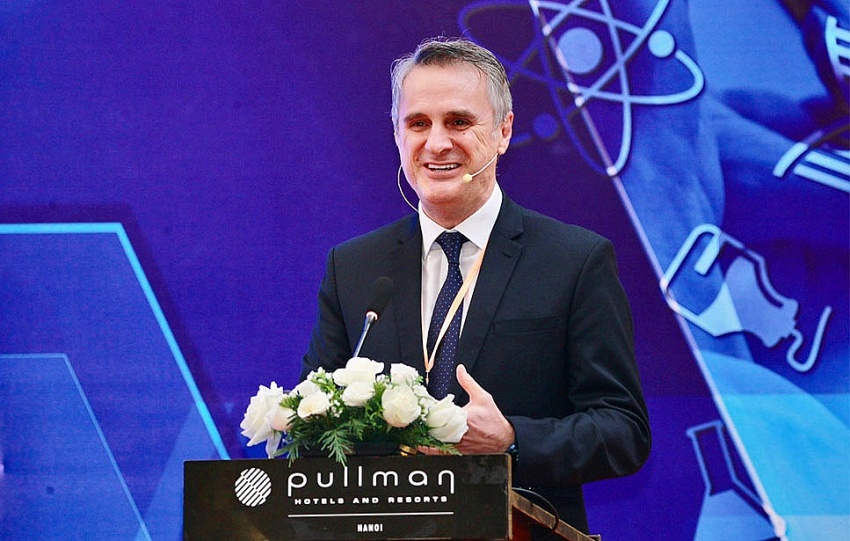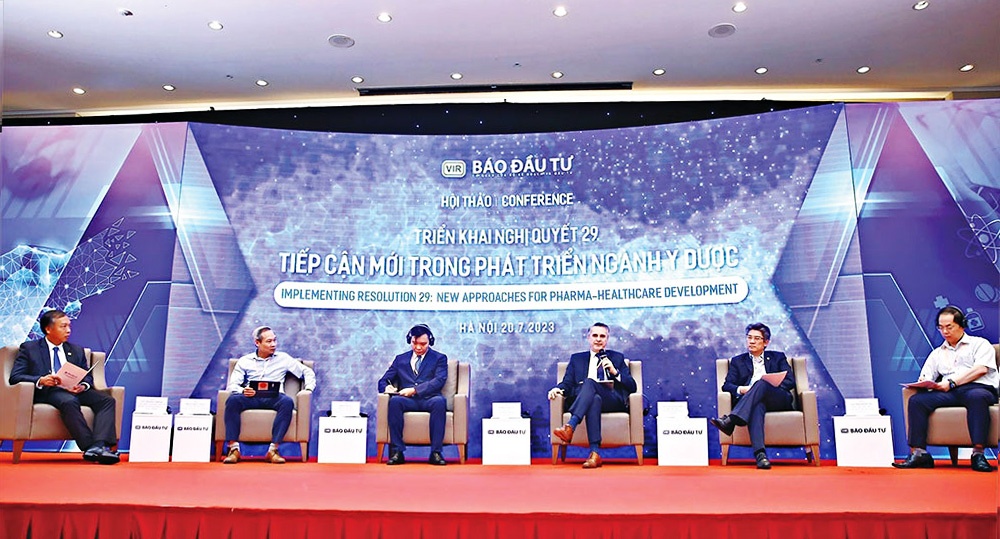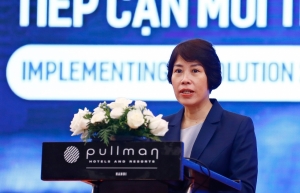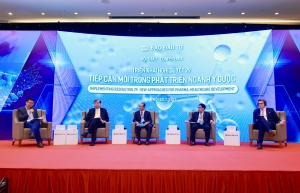Opportunities abound for innovative pharma industry
 |
| Emin Turan, chairman of Pharma Group |
What is the rationale for the regional race for pharma investment, and what are the most impactful benefits that countries can gain besides attracting foreign investment?
The global life sciences sector has emerged as one of the key drivers of the 21st-century economy, and this ascent is fuelled by remarkable scientific breakthroughs in biotechnology and related fields, alongside an increasing social demand to address healthcare challenges.
The innovative pharmaceutical industry has contributed the highest investment in innovation which extends beyond the healthcare sector, generating spillover effects that enhance national capabilities in innovation across various industries. This key value reaffirms the innovative pharmaceutical industry as a pivotal driver enabling sustainable development of a nation in the future.
The innovative pharmaceutical industry will bring huge economic and social benefits to Vietnam. According to the impact assessment report conducted by KPMG in 2022, various stakeholders, including patients, the government, and the pharmaceutical industry, stand to gain directly from its advancements.
How does the Pharma Group evaluate Vietnam’s development, and what competitive advantages does Vietnam possess that would allow it to compete with or even surpass other nations?
Over the past two decades, the Vietnamese government has built up several policies which accelerate the development of the healthcare system and pharmaceuticals. Especially, we fully support the orientation set forth in Resolution No.29-NQ/TW to establish pharmaceutical as one of the priority sectors that will enable and drive innovation.
With the consecutive economic growth and development of Vietnam, the innovative pharma sector in Vietnam has an obvious opportunity to further enhance its role in the collaboration and contribution towards Vietnam’s development aspirations as stated in Resolution 29.
Vietnam possesses several competitive advantages over countries in attracting overseas funding in this sector, including political stability, social infrastructure, geographical position, and proactive integration into economic integration.
Numerous countries in the ASEAN region are actively participating in the competition to attract foreign investment in the pharmaceutical industry. As a result, Vietnam must be vigilant and expedite its strategies to remain competitive in this dynamic landscape.
 |
| Representatives of various organisations last week offered their views on what the country must do in order to create a successful and innovative pharma landscape |
What is the level of interest among Pharma Group members in this sector in Vietnam?
Following the enactment of the 2016 Law on Pharmacy, over 90 per cent of Pharma Group’s members have established foreign-invested enterprise importers with multimillion-dollar investments in Vietnam.
As of today, only 9 per cent of new medicines (of all 460 new medicines launched from 2012 to the end of 2021) are available in Vietnam, and it is estimated that only 11 out of 100 patients have access to innovative medicines. Despite these challenges, there is optimism that the situation can be improved with enhancements in the regulatory framework.
By ensuring faster access to new medicines and introducing greater sustainability and predictability in the procurement and reimbursement processes, Vietnam can pave the way for increased investments in this market from Pharma Group members and other stakeholders.
According to a recent survey conducted by Decision Lab, both Pharma Group members and members of the Vietnam Pharmaceutical Company Association expressed a positive outlook for pharmaceutical businesses in the first half of 2023, despite macroeconomic uncertainties. This optimistic sentiment highlights a clear opportunity for the sector to grow in a sustainable direction, provided there are improvements in the legal framework.
According to Pharma Group’s strengths and global experience, which are its key focuses in the near future?
Focusing on institutional reform and developing policies to maintain current investments while attracting new investments from the innovative pharmaceutical industry, in line with the directions outlined in Resolution 29, will be crucial for the sector’s development in Vietnam.
To tailor these strategies to Vietnam’s context, we recommend establishing a national steering committee led by a deputy prime minister responsible for the sector. This committee will play a pivotal role in developing an action plan to implement Resolution 29’s directives for the pharmaceutical and healthcare sector.
Inclusivity is essential, and we propose the participation of representatives from all relevant parties in the steering committee. This collaborative approach will enable the development of a comprehensive roadmap, encompassing necessary amendments and policy developments, to achieve the specific objectives of each phase outlined in Resolution 29.
Drawing on international best practices, we firmly assert that establishing this steering committee would mark the primary and most crucial step in actualising the goals set forth in Resolution 29.
Especially in the critical next year when the revision of important legislation is expected to be formed and circulated, the Pharma Group reaffirms its commitment to supporting the government in consultations for legislation, and the formulation of development strategies and implementations for the sector.
This will be carried out by sharing information and assisting in proposing solutions that are suitable for Vietnam’s context, feasible to implement in practice, and consider the best global practices in order to accelerate patient access to new medicines, as well as ensure the sustainable and predictable investment environment in Vietnam.
To promote the value of innovation, Pharma Group will be hosting the Healthcare Innovation Forum on October 18, an annual event that brings stakeholders together to discuss technology’s driving on sustainable healthcare systems and innovative approaches and technologies to transform healthcare in Vietnam.
We hold a strong belief that by fostering open discussions, encouraging contributions, and collaborating with all stakeholders in line with Vietnam’s development aspirations, the pharma-healthcare sector is poised to achieve remarkable milestones, leading to significant economic and social advancements. Ultimately, this progress will translate into tangible benefits for the people of Vietnam.
 | Vietnam at the crossroads: The race to secure pharma investment The first panel session, themed Vietnam at the crossroads: The race to secure pharma investment, from VIR's event Realising Resolution 29: New Approaches for Pharma-Healthcare Development on July 20 drew significant attention. The discussion centred around the quality of labour in the pharmaceutical sector and the strategic decisions that Vietnam faces in its pursuit to attract investment in this vital industry. |
 | MPI calls on investors to make suggestions in pharma sector The Ministry of Planning and Investment has called on investors and manufacturers to contribute opinions and proposals to attract more investment capital and receive technology transfer to promote the development of the pharmaceutical sector of Vietnam. |
 | Powering innovation for sustainable pharma-healthcare development Experts highlighted the importance of powering innovation for sustainable pharma-healthcare development at the second panel discussion at a VIR conference on Thursday July 20. |
What the stars mean:
★ Poor ★ ★ Promising ★★★ Good ★★★★ Very good ★★★★★ Exceptional
Themes: Healthcare Platform
- PM outlines new tasks for healthcare sector
- Opella and Long Chau join forces to enhance digestive and bone health
- Hanoi intensifies airport monitoring amid Nipah disease risks
- Cosmetics rules set for overhaul under draft decree
- Policy obstacles being addressed in drug licensing and renewal
Related Contents
Latest News
More News
- PM outlines new tasks for healthcare sector (February 25, 2026 | 16:00)
- Ho Chi Minh City launches plan for innovation and digital transformation (February 25, 2026 | 09:00)
- Vietnam sets ambitious dairy growth targets (February 24, 2026 | 18:00)
- Masan Consumer names new deputy CEO to drive foods and beverages growth (February 23, 2026 | 20:52)
- Myriad risks ahead, but ones Vietnam can confront (February 20, 2026 | 15:02)
- Vietnam making the leap into AI and semiconductors (February 20, 2026 | 09:37)
- Funding must be activated for semiconductor success (February 20, 2026 | 09:20)
- Resilience as new benchmark for smarter infrastructure (February 19, 2026 | 20:35)
- A golden time to shine within ASEAN (February 19, 2026 | 20:22)
- Vietnam’s pivotal year for advancing sustainability (February 19, 2026 | 08:44)

 Tag:
Tag:




















 Mobile Version
Mobile Version